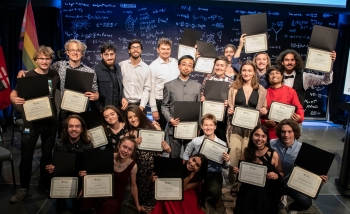Two arm's-length bodies recently put Perimeter to the test, conducting intensive reviews of the Institute's value and impact for the scientific community and for broader society. Their assessment: in just 20 years, Perimeter has transformed from a bold new idea to a world-leading centre of theoretical physics research, where stellar faculty are making major discoveries and paving the way for breakthroughs.
Perimeter's Scientific Advisory Committee, an independent oversight body, conducted a rigorous review of the Institute's recent work. This international team of eminent scientists met with faculty, postdoctoral researchers, graduate students, management, and other staff who contribute to Perimeter's work and culture.
Through presentations, interviews, and extensive document reviews, they assessed how the Institute is faring in individual areas of theoretical physics and how these groups are working together, building synergies and collaborations to answer even bigger questions about the deep structure of the physical universe.
"Perimeter is unique in the scientific landscape, with a forward-looking, innovative, collaborative and inclusive climate. It has greatly raised Canada's reputation in the field of high-level theoretical physics, and has shown a very high return on government investment, and at a fast pace," the Committee wrote. "Its hallmark is the collaborative atmosphere in which new scientific ideas are constantly exchanged and debated across disciplines. The high quality of the research conducted at PI … has only improved in the last five years."
The Committee confirmed that Perimeter's research leads both in specific areas and in the big-picture, blue-sky thinking that raises the bar across the board for ambitious, groundbreaking new ideas.
The review period for this report covered several landmark breakthroughs, including the first recorded images of a black hole, advances in the study of fast radio bursts, and rapid developments in quantum causality and quantum matter that have the potential to fuel a new industrial revolution.
Independent appraisals encourage and inform the Institute’s future research agenda. But Director Rob Myers also sees broader value:
"This kind of external assessment is vital for transparency and accountability — for researchers, and also for our supporters," says Myers. "This report shows that our work is paying off in a big way. We set some highly ambitious goals, and it is incredibly encouraging to know that we're reaching them."
The Committee also reviewed Perimeter's graduate and postgraduate programs, which train new generations of promising scientists to become leaders and innovators.
"An increasing number of very talented and diverse young scientists have emerged from its training programs," they wrote. "The Perimeter Scholars International [Perimeter's master's-level program] is very successful, with potential to grow; it also has achieved gender equity."
Perimeter's postdoctoral program is also high quality, the report noted, "encouraging interaction across disciplines and offering opportunities to work with many faculty members."
"These practices allow independent thinkers to thrive, and have led to very impressive scientific results and to many successful careers."
While the Scientific Advisory Committee focuses primarily on Perimeter's research accomplishments, their report also noted the Institute's "remarkable outreach programs" that "may well incubate a new generation of Curies and Einsteins."
"PI is bringing the public on board to understand the need for and fascination of science. The institute's educational outreach programs to teachers and secondary students are extremely impressive, helping pave the way for the scientists of our future," the Committee wrote.
Outsized impact
A separate bibliometric study conducted by Clarivate Analytics identified Perimeter's vital contributions to Canada's top rank among G7 countries in physics and space science on key measures of research quality and impact.
Clarivate, a global leader in research and data insights, measured Perimeter's performance against that of the overall research community both in Canada and in other G7 countries, revealing the Institute's disproportionate impact — which Clarivate found particularly striking given that Perimeter is home to less than 5 percent of Canada's physics research faculty.
"Measured against universities, Perimeter is not a large institute," says Myers. "And measured against places like the US or China, Canada is not a large country. So, it's truly striking to see this kind of outsized impact."
The Clarivate analysis used the number of citations garnered by each paper to measure research quality and impact. For example, the study looked at the percentage of papers counted among the most highly cited 1 percent of physics and space science papers. The data showed that 4.7 percent of Perimeter papers were in that top 1 percent.
The study also looked more broadly at citation impact, normalizing for both subfield and year of publication – a measure called Category Normalized Citation Impact, or CNCI. For the past six years, Canada has had the highest average CNCI in physics and space science among the countries Clarivate analyzed. Perimeter has been key to that success. For example, in 2019 (the most recent year for which data are available) Canada would have fallen from first to fifth if Perimeter's papers had been excluded.
"Perimeter seeks to be a hub for global science, a point of leverage that lifts all of Canadian physics," says Myers. "These reviews show that we are succeeding. The Institute has come a very long way its first 20 years. Just imagine what we’ll accomplish next."
About PI
Perimeter Institute is the world’s largest research hub devoted to theoretical physics. The independent Institute was founded in 1999 to foster breakthroughs in the fundamental understanding of our universe, from the smallest particles to the entire cosmos. Research at Perimeter is motivated by the understanding that fundamental science advances human knowledge and catalyzes innovation, and that today’s theoretical physics is tomorrow’s technology. Located in the Region of Waterloo, the not-for-profit Institute is a unique public-private endeavour, including the Governments of Ontario and Canada, that enables cutting-edge research, trains the next generation of scientific pioneers, and shares the power of physics through award-winning educational outreach and public engagement.
You might be interested in


